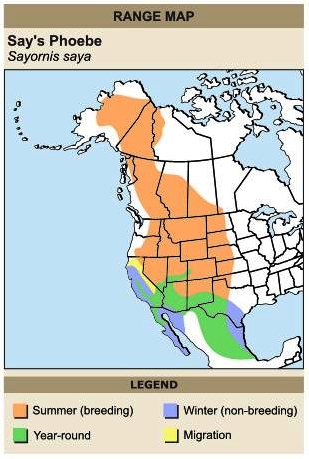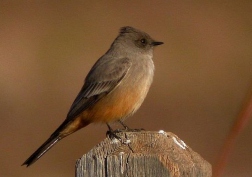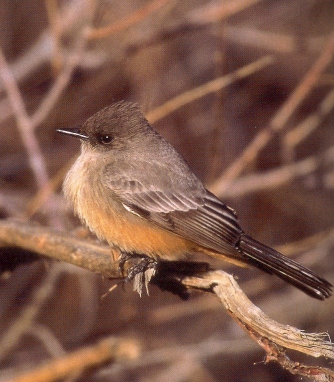Medium-sized, active
flycatcher with gray-brown upperparts and head, paler gray throat and
upper breast, and pale rufous belly and undertail coverts. The wings
and tail are dark gray. Feeds primarily on insects. Weak fluttering
flight with shallow wing beats. Hawks from perch, hovers.

|
SAY’S
PHOEBE
Sayornis saya
PASSERIFORMES
Flycatchers (Tyrannidae)
Range and Habitat
Breeds from central Alaska, Yukon, and northern Mackenzie south through
western mountains to Mexico. Spends winters in California and western
Oregon. Frequents open areas such as prairies, tundra, farmlands, and
playing fields.
SOUND:
"pidiweew", "pidireep", "pdeer", "tueeee"
The Say's Phoebe breeds farther north than any other flycatcher, seemingly
limited only by the lack of nest sites.
The numbers of this bird are declining, probably
due to loss of habitat in its winter range.
This bird was named for Thomas Say, the American naturalist.
A group of flycatchers has many collective nouns, including an "outfield",
"swatting", "zapper", and "zipper" of
flycatchers.

The Say's Phoebe has a large range, estimated globally at 7,200,000
kilometers. Native to Canada, the United States, and Mexico, this bird
prefers subtropical or tropical shrubland or temperate grassland ecosystems.
The global population of this bird is estimated at 3,700,000 individuals
and does not show signs of decline that would necessitate inclusion
on the IUCN Red List. For this reason, the current evaluation status
of Say's Phoebe is Least Concern.

|





